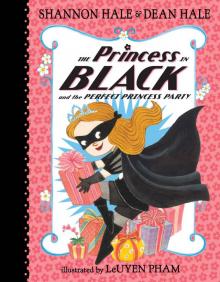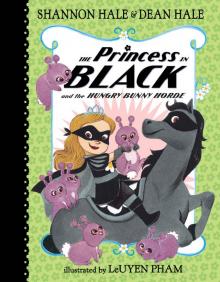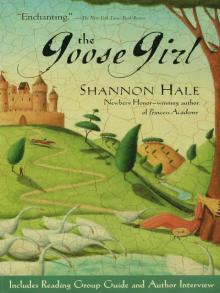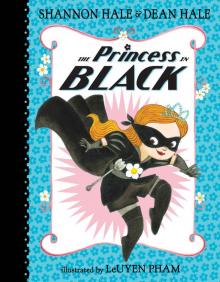- Home
- Shannon Hale
Palace of Stone Page 8
Palace of Stone Read online
Page 8
“Mmm, half of my life. One must, to reach master status.”
Miri swallowed. She had less than a year left in Asland. The weight of all she did not know felt like a boulder on her back.
“It is a shame you plan to go home after the summer. With just one more year you could become a tutor. Cat’s-eye green would become you, Miri of Mount Eskel.”
“Just one more year?” she asked.
He nodded. “Or stay two years, don the honey-drop robes, and become the first historian of Mount Eskel. You have a keen mind. One day you could wear raven’s head.”
She was glad when he walked away. His compliment did not cheer her. Rather, she felt even more pressed down by that boulder, the heaviness of impossible expectation.
Still determined to find something about her home, she turned to the massive Librarian’s Book on its pedestal. The librarians over the years had cataloged the contents of every book in the library. She located a mention of Mount Eskel in a royal treasurer’s account book, over a century old, and she hunted down the volume.
I find not a record of linder’s strange history, so I relate here what others have spoken. Two hundred years past, workers were recruited to quarry a linder cache on Mount Eskel. The stone minister reported to the king that “working with linder has altered the people,” though the details remained mysterious.
King Jorgan abolished the stone-minister post, leaving the Eskelites to fend for themselves. Only the hardiest of traders risked the trip up the cursed mountain, lured by the promise of reselling the stone to the king himself, who began building a linder palace.
When I was a lad, a common game named one child the Eskelite. If the Eskelite touched another child, he or she became infected and turned into a monster. It seems to me children no longer play this game. People do forget to fear Mount Eskel and the poisons of raw linder.
Poisons? Surely not. For much of her life, Miri had breathed in linder dust and drunk stream water white with it. Besides, if past scholars believed linder was dangerous, then why did the kings build their palace from it? Clearly the royals were not afraid of the stone.
Miri replaced the book on the shelf. There was no reason to believe the account. Still, her stomach felt full of stones, and when she tried to read a history of Lonway province, she could barely focus on the words.
Winter Week Three
Dear Marda,
Today was a rest day. Esa and I spent the morning with Peder. At lunch the girls gathered for Miri’s Salon, and I reviewed what I’d learned about Logic. Logic teaches that truth can be reasoned out using proof and careful thought. We can rid ourselves of emotions and rely on solid arguments instead.
Esa said, “My ma says truth is when your gut and your mind agree.” I nodded but really I was ashamed. Surely a thousand years of scholars know more than Esa’s ma. Still, I am ashamed that I was ashamed. Marda, I hope you are not ashamed of me for being ashamed. If so, shame on you. Or on me? Which is logical?
After chapel, Britta and I sat beside her fire and talked for hours. It eased my homesickness for you some. When Britta says Steffan’s name, her eyes change. I want to say they glow, but they do not light up like embers flickering with quiet fire.
I am trying to choose words carefully, you see. Master Filippus lectured on the importance of word choice in our Rhetoric lesson. Words can fall hard like a boulder loosed from a cliff. Words can drift unnoticed like a weed seed on a breeze. Words can sing.
So no, Britta’s eyes do not “glow” exactly. They widen, I guess, as if she is so full of the thought of Steffan, her head cannot contain it and tries to make more room. He is everything to her. And I think she is everything to him.
Peder works very hard. I do not think I am everything to him.
I am eager to return to Lady Sisela’s, but I am nervous too. For one thing, everyone there is so clever. Do they think me dull? Perhaps I should assure them that our goats enjoyed listening to me for hours on end. I am certain their bleats meant “Do go on, Miri, darling. You are immensely entertaining.”
Your immensely entertaining sister,
Miri
Chapter Ten
All hail brave King Bjorn
All hail our noble king
He is always victorious
Congenial and glorious
Ever meritorious
All hail our daring king!
Miri and Peder sat on the straw in Gus’s open shed. Last visit, Esa had come too. Miri had been impatient for next week’s end and time alone with Peder, but now that she was here, the only news they shared was silence. He seemed too tired to talk. Her own head ached, stuffed full of History and tributes and kings. Twice that week she had spied Gummonth at the palace and slinked off in the opposite direction, afraid that if he saw anyone from Mount Eskel he would remember his threat to seek their tribute.
Miri opened her mouth to spill all her worries on Peder. But instead she yawned.
A tickle on her tongue made her choke. Peder had stuck a straw into her open mouth. Miri harrumphed and scooted farther away, yawning again despite herself. Peder threaded one straw into another, and another, creating a piece as long as his arm. He wiggled it threateningly before her face.
She gasped with fake shock and made her own extended piece of straw. It was longer than Peder’s and she managed to stick it in his ear. He hit hers away with his and they began to battle, beating each other’s straw swords into pieces and remaking them, both their faces earnest, until Miri could not help it any longer and laughed out loud.
The sound broke the game. Peder looked at her. He reached out, and she thought he meant to grab her straw or perhaps yank her hair as he used to when they were little. But he put his hand behind her head and, leaning forward, pulled her face to his. He kissed her. One long, slow kiss. At first she felt nothing but shock, but he held his mouth against hers long enough for the heat from her lips to melt down her neck into her middle and out into her fingers and toes.
He let go. She opened her eyes, wide now. She became aware of the city noise, dim and hollow in their little courtyard like an echoed mountain shout, and she felt shy, as if all of Asland were watching. But they were alone.
“My ma used to say ‘Miri’s laugh is a tune you love to whistle,’” he said quietly. “Only your laugh always made me want to do something besides whistling.”
Miri stared. She was sure he would run off now, as he had after the first time he’d kissed her—a cheek kiss at the spring holiday, sudden and soft.
Peder stared back, perhaps waiting for her to flee too. Such a kiss was too remarkable to go unnoticed, too much to talk over, too lovely to let fade away.
They both stared. Neither ran.
At once, both began rebuilding their extended straws and they renewed the fight. Peder laughed this time. And Miri understood the impulse to kiss the lips that laughed.
Miri stayed with Peder for the rest of the day, mostly not talking at all. Next to Peder, in that quiet courtyard of stone, she felt so close to home she could almost smell snow behind the breeze.
At dinner hour Gus sent Peder back to work and Miri away. She let her feet wander with her thoughts, and the farther she was from Peder the less sure she felt about anything. Part of her longed to get lost in the crooked streets of that endless city. The longing frightened her.
She thought of the villagers in the coming spring, excited to hear the trader wagons approach, anticipating goods and letters but instead meeting officials who demanded all their savings. She imagined Marda’s face when they took the gold coins, and Pa’s when he realized he could not fight this kind of bandit. Miri’s heart ached.
How could she face her family again if the king’s tributes reduced them to poverty worse than before? Even Katar credited Miri for changing Mount Eskel, but the tributes would undo anything she’d done, and she had no idea how to prevent it.
Perhaps if Peder realized how useless she was, he would not like her at all.
She pulled her shawl around her, m
ore aware of winter as the sun plunged into the horizon. She had to do something. She had to figure out if change really was coming to Danland, and how to help it along before Gummonth had a chance to send officials up the mountain.
Timon would be at Sisela’s that night. Miri’s hair was not curled, her dress was not her best, but she suspected no one at the Salon would think less of her for it.
The same gray-haired servant opened the door to Miri and walked her to the Salon, his cane rapping the linder floor stones. Miri smiled at him and felt warmly toward Lady Sisela, who kept the elderly man on despite his limp. Miri knew enough of the lowlands now to suspect other nobles would have let him go.
When Miri entered the Salon, a woman was reciting a poem about rabbits and squirrels defending their offspring by overthrowing a bear, which was supposed to be metaphorical and quite dramatic. But every time the woman intoned the line “The rabbits roused and the squirrels squeaked,” Miri had to hold her breath to lock down a laugh. The thought of laughing reminded her of Peder. She touched her lips.
When the poem concluded, Sisela arose.
“Tonight, dear friends, instead of just speaking fondly of the poor, let us again go to them.”
They did not have to walk far to find the shoeless of Asland. One block away, wooden tenements grew like weeds between brick-and-stone buildings. They made their way through apartment after apartment, leaving baskets of food along with leaflets questioning tributes and the king.
The families looked worn and sleepy, usually crammed in one room, their bedding on the floor, where rats ran. No clean mountain air, no comforting snuffles from goats, no beauty from a chain of mountains springing away into forever.
“Thank you,” said a man, taking Miri’s offered basket. “We had no lunch break at work. I could eat the basket and all!”
“But today is rest day,” said Miri.
“Bless you,” he said. “There’s no rest day for factory workers.”
Even on Mount Eskel, where each block of linder sold was one stone away from starvation, the quarry workers had taken a rest day. She could not imagine endless labor, no break to attend chapel or even wash a shirt.
Miri stepped out of the sour air onto the landing, where Sisela and Clemen were huddled with three men in laborers’ garb.
“… a supply of grain from Hindrick arrives with only a handful of royal guards,” one of the men was saying. “Might be a good time to—”
He noticed Miri.
“Who is this?” he asked, staring pointedly at her feathered cap and fur-lined cloak.
“Don’t let her nobleness fool you,” said Clemen. He put an arm around Miri’s shoulder and blew her feather out of his face. “She’s one of us.”
Miri felt the warmth of those words as if they were a blazing hearth fire.
Another apartment was stuffed with girls—Miri counted twelve, and all younger than she. Miri asked if they attended school, and their faces lit up at the idea. However, all but the youngest worked in a glass factory, their blistered fingertips proof.
“I’d thought all lowland—I mean, Aslander children went to school,” Miri said when they’d returned to Sisela’s house.
“There are some schools, but few shoeless attend,” said Sisela. “Nobles demand higher tributes every year. Children must work alongside parents just to earn enough to eat.”
“Most of the adults can read, so we leave the leaflets,” said the woman Cristin, still wearing her servant garb.
“We must be able to do more to help,” Miri said.
“I agree.” Timon paced before the window, hands in his pockets. “All we do is write leaflets. Talk without action. When will the people finally rise up?”
“Patience.” Sisela put a hand on his back and he stopped pacing, his shoulders still tense. “We are gathering straw and stacking it high. All the fire needs is a spark.”
“We should seek outside help,” Timon said in a low voice.
He looked at Sisela, and she nodded and then shrugged, and Miri had the idea that an entire conversation had just passed in silence.
What do you mean by outside help, Miri was about to ask, but Clemen began to punch out a tune on the piano.
“When the spark comes,” said Clemen, “the fire will burn bright enough for the whole kingdom to see. We already have many on our side. Including our very own lady of the princess!”
Miri recognized his music as “All Hail the King,” an anthem to the monarch. Cristin coiled a scarf and placed it on Miri’s head like a crown, and a couple of the young scholars put Miri on their shoulders and spun her around.
Miri blushed and laughed, but took off the play crown as soon as her feet touched the floor.
“I don’t mean to betray Britta by being here,” she said. “She’s not like the king and queen. I’m sure when she’s princess she’ll look after the shoeless. I mean, if the changes don’t come like we hope.”
Sisela draped the scarf over Miri’s shoulders, as though dressing a doll. “Think with your mind and not your heart. Is it right that the poor go hungry while the wealthy feast?”
“No, but—”
“Is it right that our very lives are subject to a man who did nothing more than be born to a queen?”
“No.”
“I need you to believe, Miri, that things can change. If you don’t believe, you who changed your own home, how can we convince a country?”
“Lady Sisela—” Miri started.
“Sisi,” she corrected gently. She patted the lounge beside her, and Miri sat.
“You’re a noble,” Miri said. Judging from the others’ clothes, Sisela was the only noble in the room besides Miri. “Why do you work so hard for the commoners’ sake?”
Sisela tilted her head and smiled. “I don’t need to tell you this, Miri, not you of all people, but there is right and there is wrong. Even a noble should be able to tell the difference.”
“We could try to unite nobility and commoners to bring change together,” said Miri. “Others must think as you—and I—do. I mean, nobles can’t all be bad, right?”
“Show her the ledger,” said Timon.
Clemen looked at Sisela, and she nodded. He reached under the piano, removed a slat of wood, and brought out a thick leather-bound book. Timon placed it on Miri’s lap.
The title was Ledger of His Majesty’s Grievance Official. In her course on Law, Miri had learned that if commoners accused a noble of a crime, they had the right to petition the king. Past kings heard grievances in their linder palace, but King Bjorn did not take the time. Instead he sent a Grievance Official to the provinces.
Miri opened to a random page.
CLAIM: Farmer accuses Lord Jemel’s guards of stealing his horses.
FINDING: Perhaps the farmer ate his own horses.
RULING: In favor of Lord Jemel.
CLAIM: Miller accuses Lady Katarina of excessive tributes, resulting in the starving death of his son.
FINDING: Millers are often unreliable.
RULING: In favor of Lady Katarina.
CLAIM: Farmer accuses Lord Halffword of ill-using his daughter.
FINDING: The daughter is thirteen and too young to be trusted.
RULING: In favor of Lord Halffword.
Miri paged through the ledger, searching for any instance when the Grievance Official believed the commoner.
“Every claim’s ruling is in favor of the noble,” Timon said, guessing her thoughts. “For twenty years, every single claim. Nobles bribe the officials. Commoners never have a chance.”
Miri might have thrown the book across the room then if Clemen had not taken it first, putting it back in its hiding place.
“They can’t get away with it!” Miri said.
“They already do,” Sisela said. “You see why I scorn my own kind. Nobles are as selfish and untrustworthy as royalty. They know the king overreaches his power—they scorned him with rubbish at the gift giving—and yet they do nothing for the commoners. The cha
nges we dream of will only come if commoners seize their own future.”
Miri nodded, but she shivered as if just realizing how cold the world was. Sisela put a warm arm around her, and Miri was tempted to rest her head on the woman’s shoulder. She missed Marda and Pa. She missed home.
A group in the corner were laughing as they sang. Clemen was again playing “All Hail the King,” but the group had toyed with the lyrics.
He is ever inglorious
His laugh is laborious
His smell is notorious
Impale the herring king!
Pounding knocks at the front door surprised the song from their tongues. Miri had not imagined that Sisela could look afraid.
“It might not be—” Clemen began.
“But it might,” said Sisela. “Go!”
There was a scramble. Timon took Miri’s hand, leading her to the rear door of the Salon. She glanced back. Clemen began a casual tune at the piano, and Sisela plucked the feather from her hair and reclined on her lounge. All the rest were running. The Salon door was opening. Timon yanked her out.
They raced through a maze of rooms, all dark, cold, and empty. Miri kept expecting to trip over a chair or table or anything at all, but their passage was clear. They exited the house in the back, sidled down a crack of an alley into the street, and then stopped. Timon placed Miri’s hand on his arm and began to stroll. She darted one glance back. An official and several soldiers stood outside Sisela’s house. One met Miri’s eyes and frowned. Miri forced herself to look up at Timon and even managed a carefree smile.
“What a droll little play,” he said, loud enough for his voice to carry. “Did you enjoy it?”
“Indeed!” she said. “Wasn’t the jester amusing?”
Miri and Timon laughed until they were around the corner. She let go of his arm.
“What happened?”
Timon frowned. “It’s illegal to meet in groups to discuss politics.”
“It is? But those officials couldn’t know what we talked about. It might have just been a party.”
“They don’t have to prove it. If they find us assembled together and even suspect we were talking about laws and the king, they could take us to the prisons, where people often die of disease and neglect before they reach trial.”

 The Princess in Black and the Perfect Princess Party
The Princess in Black and the Perfect Princess Party The Princess in Black and the Hungry Bunny Horde
The Princess in Black and the Hungry Bunny Horde The Unfairest of Them All
The Unfairest of Them All Forest Born
Forest Born 2 Fuzzy, 2 Furious
2 Fuzzy, 2 Furious The Actor and the Housewife
The Actor and the Housewife The Goose Girl
The Goose Girl Palace of Stone
Palace of Stone Midnight in Austenland
Midnight in Austenland Enna Burning
Enna Burning Dangerous
Dangerous The Storybook of Legends
The Storybook of Legends Princess Academy
Princess Academy Austenland
Austenland The Forgotten Sisters
The Forgotten Sisters The Unbeatable Squirrel Girl: Squirrel Meets World
The Unbeatable Squirrel Girl: Squirrel Meets World Book of a Thousand Days
Book of a Thousand Days Fire and Ice
Fire and Ice The Princess in Black Takes a Vacation
The Princess in Black Takes a Vacation River Secrets
River Secrets The Princess in Black
The Princess in Black Books of Bayern Series Bundle
Books of Bayern Series Bundle True Heroes
True Heroes Austenland: A Novel
Austenland: A Novel The Princess in Black and the Science Fair Scare
The Princess in Black and the Science Fair Scare![[Bayern 02] - Enna Burning Read online](http://i1.bookreadfree.com/i1/04/02/bayern_02_-_enna_burning_preview.jpg) [Bayern 02] - Enna Burning
[Bayern 02] - Enna Burning Ever After High
Ever After High Monster High/Ever After High--The Legend of Shadow High
Monster High/Ever After High--The Legend of Shadow High